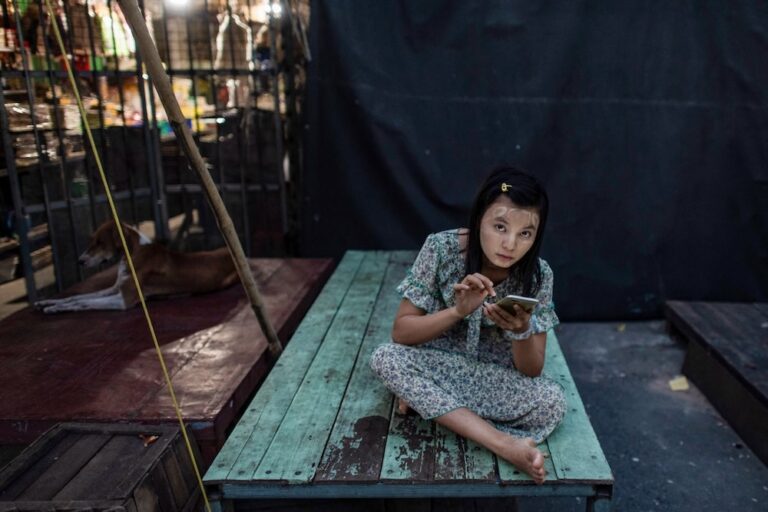"International donors to Burma's elections should be expressing public concern over the election commission's bias in favor of the military and its censorship of criticism," HRW said. "Elections should be an occasion for more political speech, not less."
This statement was originally published on hrw.org on 31 August 2015.
The Burmese election commission should immediately revoke new regulations that prohibit political parties and candidates from criticizing the Burmese military and the constitution on state media, Human Rights Watch said today. Curtailing discussion of issues fundamental to Burma’s future violates the right to free expression and deprives the public of the right to information and the ability to debate key issues, which is a central purpose of democratic elections.
The Union Election Commission (UEC) announced on August 29, 2015, that policy statements by political parties ahead of the November 8 polls would be limited to 15 minutes on state-controlled radio and television and then republished in state-controlled newspapers, and could not criticize the Tatmadaw (armed forces) or the 2008 constitution. The constitution was passed in a rigged referendum controlled by the military. The UEC and Ministry of Information will vet all statements and ensure no language is included “that can split the Tatmadaw or that can disgrace and damage the dignity of the Tatmadaw.”
“The role of the military and possibly amending the constitution are central issues in the upcoming election,” said Brad Adams, Asia director. “A gag order on criticizing the military and the constitution shows the army’s lack of commitment to democracy. This throwback to the days of military dictatorship reveals the dangerous collusion between the armed forces and the election commission.”
The new order undermines the Code of Conduct for Political Parties and Candidates, which was drafted in consultation with several political parties and signed on June 26 by 67 parties (out of an estimated 90 fielding candidates). It states that all parties will respect the rights of others to “present their ideas, basic principles, and political agendas; to have free access to mass media for political canvassing; and to publish and distribute their electoral documents and materials without hindrance, intimidation or coercion, as set out in existing laws or regulations.”
The UEC prohibition on criticism of the military in state media comes after members of parliament (MPs) and others have increasingly spoken out against the military’s attempts to block proposed amendments to the constitution. In parliamentary debates in June, 61 percent of MPs in the national assembly voted to amend section 436(a) of the constitution, which requires that amendments to key provisions in the constitution be first supported by 75 percent of MPs, and then by over half of eligible voters in a nationwide referendum. Through the constitution, the military has guaranteed itself 25 percent of seats in the parliament, giving it an effective veto over amendments, including any that could dilute its power.
In July several student activists who publicly decried the military’s de facto veto power were arrested and now face charges of unlawful assembly.
“While Burmese leaders and foreign supporters are touting the elections as evidence of real progress in Burma, the military is moving to curb speech necessary for free and fair elections,” Adams said. “An accurate measure of the military’s commitment to democratic reform is in its continued intimidation of opposition political parties, dissident students, and outspoken journalists. The army is showing it still has strong authoritarian instincts that could undermine the legitimacy of the elections.”
The UEC statement renews longstanding concerns over the independence of the commission and its chairman, former Army General Tin Aye. In a June 2015 media interview, he said that he wanted to see the ruling party, the military-backed Union Solidarity and Development Party (USDA), win the elections, but “win fairly.” On March 27, during the annual Armed Forces Day parade in the capital, Naypyidaw, Tin Aye wore his military uniform during the ceremony, saying:
I would give up my life to wear my uniform. I wear it because I want to. That’s why I wear it even if I have to quit [the UEC] because of that. But there is no law saying I should resign for wearing [my] uniform.
Election observers say that despite its clear biases, the UEC has taken some positive steps, including voter education, the displaying of updated voter lists of an estimated 31 million voters throughout Burma, and the drafting of codes of conduct for political parties and domestic monitors. Some 16,000 domestic observers are expected to take part on polling day. However, the UEC leadership is dominated by former officials of the military-controlled government and senior military officers, calling into question its independence from the government. The 2008 constitution mandates that the armed forces fill three key cabinet portfolios including the Ministry of Home Affairs and its General Administration Department, which plays a key role in the elections. Senior UEC officials also routinely change directives at the last minute, creating confusion among many election-related organizations.
UEC media guidelines issued in early August proposed restrictions on Burmese media outlets, including a quota on journalists per township. These were reportedly scrapped after talks between the UEC and the nongovernmental Burmese Interim Press Council. Restrictions on foreign journalists have yet to be made public by the UEC and the Ministry of Information. There are increased concerns in the lead-up to the election about state intimidation and harassment of the media, with several journalists still in prison for reporting on military issues. The case of Par Kyi, a Burmese freelance reporter shot and killed by the military in October 2014, is still not resolved, despite military and judicial investigations.
“International donors to Burma’s elections should be expressing public concern over the election commission’s bias in favor of the military and its censorship of criticism,” Adams said. “Elections should be an occasion for more political speech, not less. These kinds of rules have no place in an electoral process worth calling ‘democratic.’”


